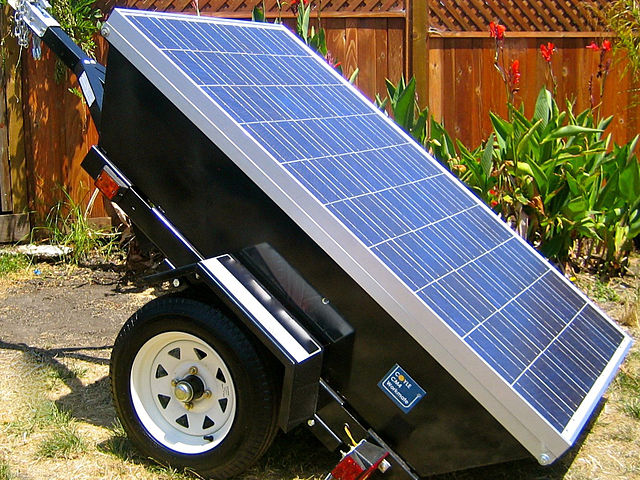Solar Powered Generators
Solar powered generators are a
great replacement for traditional gas powered models. They do
not put out any noxious fumes and are virtually silent, making them
perfect for indoor use. Also, there are no moving parts which
nearly eliminates required maintenance. They have the ability
to power all of the same devices that a gas generator can given
similar wattage outputs. They are also capable of directly
powering DC (direct current) products making them perfect for
camping, RV's and specifically designed low voltage appliances for a
residence. A solar powered generator captures energy
from the sun through solar panels or cells and stores the juice in
self contained batteries. They can also be charged entirely or
supplementary by a residential wind
turbine and by connecting them to a standard AC (alternating
current) wall socket. A car charger is also an option with
most units. The flexibility in power recharging sources can
help insure that the owner will have emergency (or day to day, for
those off grid) power when needed or desired.
Solar generators are basically a
condensed collection of several parts normally found in home solar
setups. The self contained, portable units are usually comprised of...
SLA Batteries (Sealed Lead Acid)
Power Inverter - Changes DC Electricity to AC
Charge Controller / Fuses
Digital Display of Voltage & Charge Status
DC, AC outlets and USB ports
A Cart or Wheels for Portability

Store purchased solar powered generators can be attached together
in a series or chain. This is especially useful if you have
more than one. Say you have a unit for your RV & one for
your home, they can be linked together to provide increased wattage
- power output to enable more devices for longer periods of time.
Solar generators are obviously designed to be
recharged with solar panels. (among other methods) but that isn't an
absolute necessity. If the primary intent is to power a
refrigerator / freezer in the event of a power failure, you can make
sure the batteries are charged from your homes power outlets & just
plug them in when the situation arises. The length of uptime
will depend on the size of your generator and the wattage
requirement of your
appliances. Being able to recharge (or use in real time) from
non-traditional sources like sunlight, increases the duration of
energy output indefinitely. Note - if you are not connecting
the generator to a solar or wind source you will need to plug it in
every 3 or 4 months to ensure that the batteries are "topped off".
Solar energy generator kits are available that include
solar panels, controllers, cabling and additional accessories for those that want
to get the most functionality out of their investment. These
kits are typically pretty easy to configure and use for those who
are even slightly handy.
Pros and Cons:
Pros
No Exhaust - Use Inside
No Flammable Fuel to Store or Buy
Free Energy - Recharging
Silent Operation
Very Low Maintenance
Portable & Scalable
Better for the Environment
Safer Operation & Storage
Cons
Higher Upfront Cost than Gas Generator
Weight - Usually Heavy
Lengthy Recharge Times
A small side note...unless the contraption is
physically connected to
an electrical production device such as a solar panel, pedal /
hand power crank or wind turbine, the word
"generator" is technically incorrect.
|